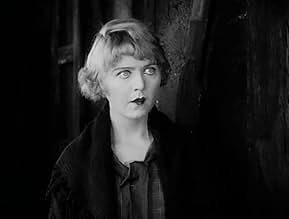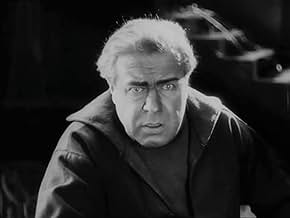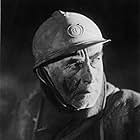One can see very easily how it came about, but the fact is this is a rather unfortunate misjudgment based on a misunderstanding.
Marcel L'Herbier, one of the most distinguished French directors of the period, had produced two wonderful films in the decade - L'Argent and L'Inhumaine, classics of European cinema with a soupçon of the avant-garde. But such films, however successful in Europe, would never have a chance in the US market. So what L'Herbier seems to have done here is to try and produce a very conventional (a bit painfully conventional) US-friendly sentimental drama, capitalisng on the fact that British actress Betty Balfour had a slightly spurious reputation of being "a British Mary Pickford".
But their is a blatant mismatch. The style of the film is very European, non-realistic (especially in the early scenes), a sort of prefiguring of poetic realism), deep focus, snatches of impressionistic montage, often superb to watch. But the story is completely unworthy.... One has the impression that serious film-makers are putting their art in the service of making a film for idiots. Happy End and all.
And I think that is pretty much what L'Herbier intended and pretty much sums up the European attitude towards US films (then and now). But it is founded on a misunderstanding (which is why it doesn't really work). US films were puerile in content, it is true, and often mawkishly and falsely sentimental (precisely the effect that US studios insisted upon). It is also true that they were stylistically very limited as the corseting of "realism" was pulled ever tighter.
BUT (and it is a very very big but because it is the key to US cinema not merely of this period but throughout its history), US films are to a large degree driven by their limitations rather than by their strengths, in the sense that their quality lies in the extent to which they are able to run agsinst their own grain, evading the banal expectations of the producers and often, for that matter of the audiences. Unlike in Europe where films weer and are generally a product of the co-operation of producer and director, in the US they are typically the product of a conflict between producer and director. Sometime this was straightforward open warfare (s between Thalberg and Von Stroheim), a war which in the end the director would also end up by losing but often it was a more asymmetric struggle fought with sleight of hand or word (as with a director like Lubitsch or a writer like Hecht) which the producers (like the US military) were less competent to deal with (or even understand).
The best US directors and writers, however seemingly obedient to their masters, had already learned by this time to build in a sort of against-the-grain subtext to their films (often cynically exploitative but very effective) and it is that mildly subversive subtext that added the "salt" to the stew and meant that the films still worked despite their puerile content.
L'Herbier has quite ably copied the US format while very ably opening out the style in a way that US directors rarely dared to do (Vidor's The Crowd is the obvious counter-example in the same year - but flopped). But L'Herbier has forgotten the "salt". The films, despite it lively beginning, is thereafter direly slow and lacks any real sharpness or tension. As a result we have a beautifully-made film that simply doesn't work either in European or in US terms.
But the failed attempt does help us to understand a lot about the difference between European and US films (then and now) and how the former could sometime fail despite their excellencies (the Europeans found it difficult to ignore the rich US market) and why the latter often succeed despite their quite evident failings.

















